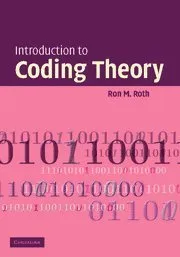Introduction to coding theory
5.0
Reviews from our users

You Can Ask your questions from this book's AI after Login
Each download or ask from book AI costs 2 points. To earn more free points, please visit the Points Guide Page and complete some valuable actions.Introduction to Coding Theory
"Introduction to Coding Theory" is a cornerstone text in the field of error-correcting codes, designed to elucidate the principles, applications, and algorithms that enable modern digital communication systems to function reliably. Written with precision and clarity, this book bridges the gap between theoretical foundations and practical implementations of coding theory, making it suitable for students, researchers, and engineers alike. It not only delves into mathematical and algorithmic aspects but also explores real-world applications that exemplify the profound impact of coding theory in advancing digital systems.
Detailed Summary of the Book
The book begins with an introduction to the fundamental concepts of coding theory, offering insight into the challenges of error detection and correction in digital communications. It carefully dissects the principles of information theory, channel models, and the need for codes in mitigating the effects of noise and interference.
Subsequent chapters delve into various types of codes, such as linear block codes, cyclic codes, BCH codes, and Reed-Solomon codes. Each type is explored with rigorous theoretical analysis, supported by illustrative examples and practical applications. The author adopts a structured approach, guiding readers through encoding and decoding algorithms, minimum distance calculations, and error-correction capabilities.
A significant portion of the book is devoted to modern advancements in coding theory, including convolutional codes, Turbo codes, and low-density parity-check (LDPC) codes. These advanced coding schemes are described in detail, emphasizing their role in next-generation communication technologies. The book also addresses performance analysis and decoding techniques, equipping readers with the tools to evaluate and optimize code formulations for specific applications.
Additionally, "Introduction to Coding Theory" explores connections between coding theory and other fields such as cryptography, machine learning, and data storage, highlighting its multidisciplinary relevance. By presenting well-rounded content, the book succeeds in catering to a broad audience—both those looking to grasp the basics and those seeking deeper theoretical understanding.
Key Takeaways
- In-depth understanding of error-correcting codes and their significance in safeguarding data integrity in digital communication systems.
- Step-by-step analysis of coding schemes including linear codes, cyclic codes, and advanced modern codes like LDPC and Turbo codes.
- Practical applications of coding theory in fields like telecommunications, data storage, and secure communications.
- Well-illustrated algorithms for encoding, decoding, and error detection techniques tailored for real-world implementation.
- Analytical tools for performance evaluation that empower readers to design and optimize codes for various channels and environments.
Famous Quotes from the Book
"Coding theory is not just about creating codes; it's about ensuring trust in the information conveyed across unreliable mediums."
"Every error corrected is not just noise silenced, but a step toward flawless communication—a cornerstone of modern technology."
"From the zeros and ones of binary systems to the complexity of contemporary channel coding, the journey of coding theory mirrors the journey of technology itself."
Why This Book Matters
In an age defined by data, communication, and connectivity, the reliability of digital systems is paramount. "Introduction to Coding Theory" serves as a foundational text for understanding the algorithms and principles that underpin error correction and fault tolerance in these systems. By laying bare the mathematics behind error-correcting codes while also demonstrating their real-world impact, the book facilitates a deeper appreciation for the intricacies of information transfer in noisy environments.
This book remains highly relevant for anyone seeking expertise in coding theory, whether as a student or a professional in the fields of data science, computer networking, telecommunications, or electronic engineering. Its comprehensive content and practical focus make it an indispensable resource for both academic study and industrial application.
From enabling seamless global communications to securing data on hard drives, the principles explained in this book continue to shape and inform the technologies that connect our world. Whether you're fascinated by the mathematics of error correction or by the engineering marvels behind flawless data transmission, "Introduction to Coding Theory" offers a rich reservoir of knowledge and insight, proving why coding theory remains at the heart of modern science and technology.
Free Direct Download
You Can Download this book after Login
Accessing books through legal platforms and public libraries not only supports the rights of authors and publishers but also contributes to the sustainability of reading culture. Before downloading, please take a moment to consider these options.
Find this book on other platforms:
WorldCat helps you find books in libraries worldwide.
See ratings, reviews, and discussions on Goodreads.
Find and buy rare or used books on AbeBooks.


